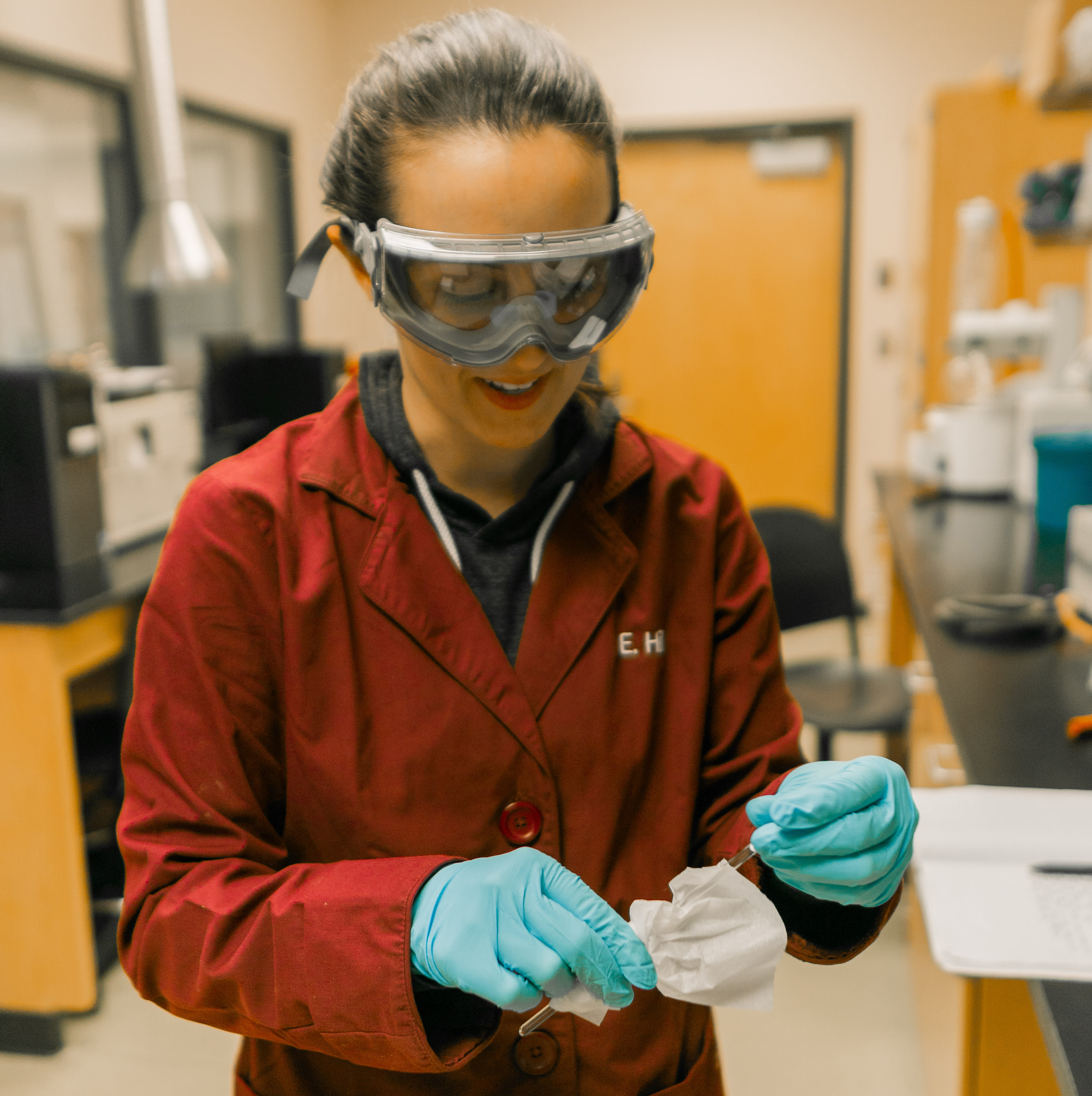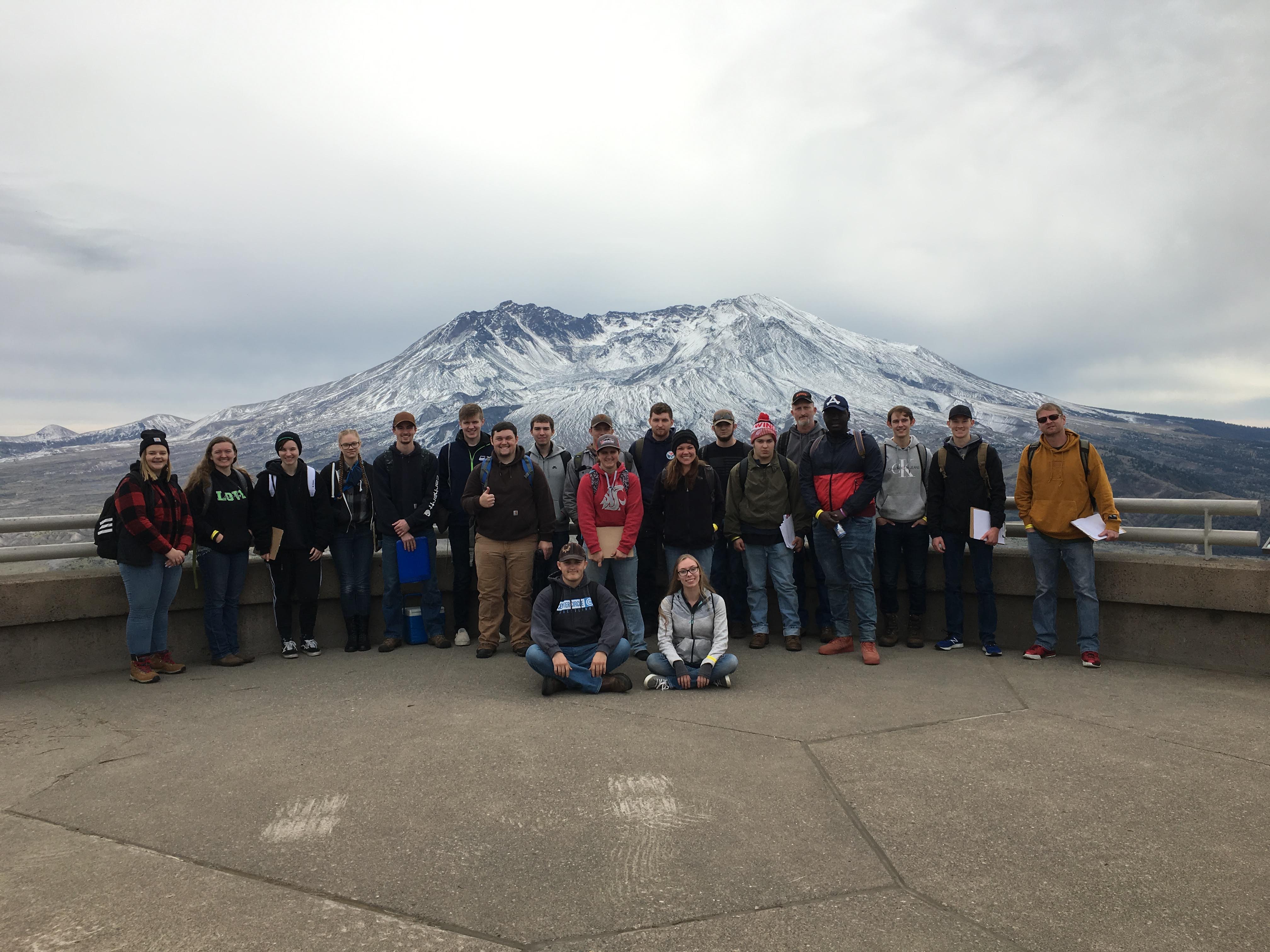Physical & Earth Sciences

The Physical and Earth Sciences focus on the natural world and the techniques used to probe natural phenomena. They include chemistry, geology, and physics.
Chemistry
The Chemistry department at Centralia College is dedicated to providing appropriate courses for students going into allied health fields as well as those students transferring to four-year institutions as science majors.
For science majors, we offer both freshman and sophomore level chemistry courses, so that upon transfer, students will be well prepared for upper division coursework.
Students will find the chemistry courses to be challenging, but also engaging, interesting, and fun. Labs are closely tied to the material being taught in lecture, so students can actually explore chemical phenomena and reactions in the lab setting.
 Geology
Geology
Geology is the study of the Earth’s physical structure and substances, the history of rocks, the processes that act on them and the most economic way to use the world’s resources. Geology involves methods and knowledge from biology, chemistry, physics and mathematics.
A strong core of comprehensive geology courses prepares you for further study in a variety of earth sciences, including geosciences, geophysics, and oceanography.
Physics
Physics is the most fundamental of the physical sciences. It is the study of the interactions between matter and energy in the universe. Among the major subfields of physics are mechanics, thermodynamics, electricity & magnetism, optics, atomic & nuclear physics, and condensed matter physics.
Chemistry
Students who complete an associate in science in chemistry go on to find careers in many fields. For more detailed career information, visit the American Chemical Society careers page.
Geology
For students with training in geology, potential employers include:
- Environmental agencies and consultancies
- Oil, gas, petroleum, groundwater, civil engineering and construction companies
- Waste management agencies
- Government organizations
- Museums.
Physics
Physics majors have skills that are in high demand in many sectors. Numeracy, problem-solving, data analysis and the ability to communicate complex ideas are highly sought after. This opens up a wealth of career possibilities in fields such as:
- Fundamental research
- Engineering
- Education
- Manufacturing
- Aerospace
- Finance
- Defense
- Health care
- Energy
- Telecommunications
- Climate science engineering
Chemistry Education Plan
Degree: Associate in Science
Emphasis: Chemistry
| First year | |
| Fall Quarter |
|
| Winter Quarter |
|
| Spring Quarter |
|
| Second Year | |
| Fall Quarter |
|
| Winter Quarter |
|
| Spring Quarter |
|
CHEM& 121 - Introduction to Chemistry
Survey of chemistry with applications in everyday life: atoms, bonds, reactions, and calculations. Prerequisite: one year high shool algebra or MATH 098.
CHEM& 131 - Introduction to Organic/Biochemistry
Study of major organic functional groups and their properties and major biochemical compounds including carbohydrates, lipids, proteins, and major cellular energy pathways. Targeted for allied health programs.
CHEM 159 - Problem Solving in Chemistry
This course is designed to provide instruction and practice in quantitative problem solving, critical thinking, and the mathematics and study skills that are required to be successful in CHEM& 161. Corequisite: CHEM& 161.
CHEM& 161 - General Chemistry w/lab I
First of a three-quarter sequence for science and engineering majors. Includes matter, measurements, equations, stoichiometry, solution chemistry, gasses, thermochemistry, quantum theory, and electronic structure. Problem solving and critical thinking are stressed. Includes lab. Prerequisite: CHEM& 121 (minimum 2.0) and MATH 099 or equiv., or instructor permission.
CHEM& 162 - General Chemistry w/lab II
Second of a three-quarter sequence. Includes periodic trends, chemical bonding and structure, valence bond/molecular orbital theory, intermolecular forces, liquids and solids, solutions, and kinetics. Lab emphasizes data analysis and interpretation. Prerequisite: CHEM& 161 with a 2.0 or better or instructor permission.
CHEM& 163 - General Chemistry III w/Lab
Third of a three-quarter sequence. Includes equilibrium, acids and base and solubility equilibria, thermodynamics, electrochemistry, and an introduction to organic and nuclear chemistry. May include polymers, transition metal, and/or coordination chemistry. Prerequisite: CHEM& 162 with a 2.0 or better or instructor permission.
CHEM& 261 - Organic Chemistry I
First course in a three-quarter sequence for science and pre-professional majors. Topics covered include structure, nomenclature, reactions and properties of hydrocarbons, and alkyl halides. Includes mechanisms and stereochemistry. Lab focuses on laboratory techniques. Prerequisite: CHEM& 163 with 2.0 or greater or instructor permission.
CHEM& 262 - Organic Chemistry w/lab II
Second course in the sequence. Topics covered include structure, nomenclature, reactions and properties of alkenes, alkynes, alcohols, eithers, and conjugated and aromatic systems. Spectroscopy topics include IR, NMR, and MS analysis, including structure elucidation. Prerequisite: CHEM& 261 with 2.0 or greater or instructor permission.
CHEM& 263 - Organic Chemistry w/lab III
Final course in the sequence. Topics covered include structure, nomenclature, reactions and properties of aromatics, aldehydes, ketones, carboxylic acids and their derivatives, and amines. Enol/enolate chemistry and radical reactions will also be covered. Prerequisite: CHEM& 262 with 2.0 or greater or instructor permission.
CHEM 270 - Research in Chemistry
Design a research project, set up experiments, collect data in the lab or in the field, and/or analyze data. Each credit hour requires 33 hours of activity per quarter. Prerequisite: instructor permission.
Geology Education Plan
Degree: Associate in Science
Emphasis: Geology, Environmental Geosciences, Geophysics, Oceanography
| First Year | |
| Fall Quarter |
|
| Winter Quarter |
|
| Spring Quarter |
* Some four-year institutions require physics with calculus. |
| Second Year | |
| Fall Quarter |
|
| Winter Quarter |
|
| Spring Quarter |
** Although the Biology (for majors) sequence can be substituted to complete your AS degree, most baccalaureate institutions require physics with calculus sequence. |
GEOL 100 - Geology for Engineering & Environmental Studies
Explore minerals and rocks, geological processes, and geological investigation techniques that relate to geotechnical and environmental concerns.
GEOL& 101 - Intro Physical Geology
Explore and recognize earth materials, processes and structures within a plate tectonics framework; origin and structure of the Earth, rocks and minerals, geologic time, earthquakes and volcanoes, ocean basins, formation of landscapes, special topics.
GEOL 102 - Physical Geology II
Introduces the processes that shape the landscape. Includes the study of mass wasting, river dynamics, groundwater sources, glacial landforms, deserts, and coastal processes. One or more field trips may be required. Includes lab. Prerequisite: MATH 098
GEOL& 103 - Historical Geology w/Lab
Evolution of Earth and life as interpreted through the fossil and rock record. Includes fossils, relative and numerical-age dating, stratigraphic principles, global change, and the geologic history of the North American continent. Includes lab.
GEOL 108 - Natural Hazards and Catastrophes
An examination of earth materials and processes through the study of earthquakes, volcanoes, landslides, floods, tsunamis, hurricanes, tornadoes, wildfires, and meteorite impacts. Examination of causes and effects on human populations and the environment; preparedness, prediction and forecasting; mitigation of risks, and case studies.
GEOL 180 - Cascade and Plateau Geology
Students will explore the geology of a selected area of interest, for example, Hawaii, Grand Canyon, Rocky Mountains, Cascades, Yellowstone, Tetons, Southwest Deserts, etc.
GEOL& 208 - Geology of Pacific NW
Examines the geology and geologic history of the Pacific Northwest and geologic processes important to its evolution. Topics include volcanoes, earthquakes, plate tectonics, rock and minerals, faults and folds, mountain building, landforms, glaciation, and surface processes.
GEOL 270 - Research in Geology
Design a research project, set up experiments, collect data in the lab or in the field, and/or analyze data. Each credit hour requires 33 hours of activity per quarter. Prerequisite: instructor permission.
Physics Education Plan
Degree: Associate in Science
Emphasis: Physics
Notes for Students
- If you were not well prepared in high school mathematics and science, you should plan, with your advisor, a three-year program at Centralia College in preparation for transfer to a four-year college or university.
- The emphasis in the first year at Centralia should be on strengthening skills in mathematics, basic sciences, communications, and reading.
| First Year | |
| Fall Quarter |
|
| Winter Quarter |
|
| Spring Quarter |
|
| Second Year | |
| Fall Quarter |
|
| Winter Quarter |
|
| Spring Quarter |
|
PHYS& 110 - Physics for Non-Science Majors w/Lab
A survey of physics with applications in everyday life for non-science majors. Basic concepts in Newtonian mechanics, thermodynamics, electricity, magnetism, optics, and modern physics. Requires knowledge of basic algebra. Includes a 2 hour lab.
PHYS& 114 - General Physics I w/Lab
Fundamentals of classical mechanics. The first of a three quarter sequence for science majors not requiring calculus based physics. Classica l mechanics including statics and dynamics of particles, rigid bodies, and fluids. Prerequisite: two years HS algebra and trigonometry or concurrent enrollment in MATH 110.
PHYS& 115 - General Physics II w/Lab
Fluids, electrostatics, simple circuits, and the fundamental laws of thermodynamics. A continuation of PHYS& 114. Prerequisite: PHYS& 114.
PHYS& 116 - General Physics III w/Lab
Magnetism and A.C. circuits, optics, and modern physics. Includes Laws of Faraday, Lenz, and Ampere, geometrical and physical optics, special relativity, atomic and nuclear physics. A continuation of PHYS& 114 and PHYS& 115. Prerequisite: PHYS& 115.
PHYS& 221 - Engineering Physics I
First in a three quarter calculus-based sequence for science and engineering majors stressing classical mechanics. Include dynamics of translational, rotation, and oscillatory systems of solids, particles and fluids. Prerequisite: MATH& 151 and Corequisite: MATH& 152
PHYS& 222 - Engineering Physics II
Wave motion, thermodynamics, and electrostatics. Includes sound, heat transfer, law of thermodynamics, and electric fields. Prerequisite: PH YS& 221 and MATH& 152 and corequisite: MATH& 153.
PHYS& 223 - Engineering Physics III
Optics modern physics, electricity and magnetism. Includes geometrical and physical optics, Maxwell’s equations, AC/ DC circuits and special relativity. Prerequisite: PHYS& 222 and MATH& 153.
PHYS 270 - Research in Physics
Design a research project, set up experiments, collect data in the lab or in the field, and/or analyze data. Each credit hour requires 33 hours of activity per quarter. Prerequisite: instructor permission.
Contact
|
Emily Sprafka Coleman (she/her/hers) |
Michelle Harris (she/her/hers) |
Michael Threapleton (he/him/his) |
